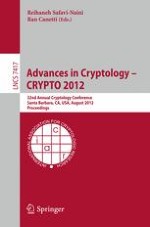2012 | OriginalPaper | Chapter
Differential Privacy with Imperfect Randomness
Authors : Yevgeniy Dodis, Adriana López-Alt, Ilya Mironov, Salil Vadhan
Published in: Advances in Cryptology – CRYPTO 2012
Publisher: Springer Berlin Heidelberg
Activate our intelligent search to find suitable subject content or patents.
Select sections of text to find matching patents with Artificial Intelligence. powered by
Select sections of text to find additional relevant content using AI-assisted search. powered by
In this work we revisit the question of basing cryptography on imperfect randomness. Bosley and Dodis (TCC’07) showed that if a source of randomness
$\mathcal{R}$
is “good enough” to generate a secret key capable of encrypting
k
bits, then one can deterministically extract nearly
k
almost uniform bits from
$\mathcal{R}$
, suggesting that traditional privacy notions (namely, indistinguishability of encryption) requires an “extractable” source of randomness. Other, even stronger impossibility results are known for achieving privacy under specific “non-extractable” sources of randomness, such as the
γ
-Santha-Vazirani (SV) source, where each next bit has fresh entropy, but is allowed to have a small bias
γ
< 1 (possibly depending on prior bits).
We ask whether similar negative results also hold for a more recent notion of privacy called
differential privacy
(Dwork et al., TCC’06), concentrating, in particular, on achieving differential privacy with the Santha-Vazirani source. We show that the answer is
no
. Specifically, we give a differentially private mechanism for approximating arbitrary “low sensitivity” functions that works even with randomness coming from a
γ
-Santha-Vazirani source, for any
γ
< 1. This provides a somewhat surprising “separation” between traditional privacy and differential privacy with respect to imperfect randomness.
Interestingly, the design of our mechanism is quite different from the traditional “additive-noise” mechanisms (e.g., Laplace mechanism) successfully utilized to achieve differential privacy with perfect randomness. Indeed, we show that
any
(non-trivial) “SV-robust” mechanism for our problem requires a demanding property called
consistent sampling
, which is strictly stronger than differential privacy, and cannot be satisfied by any additive-noise mechanism.
